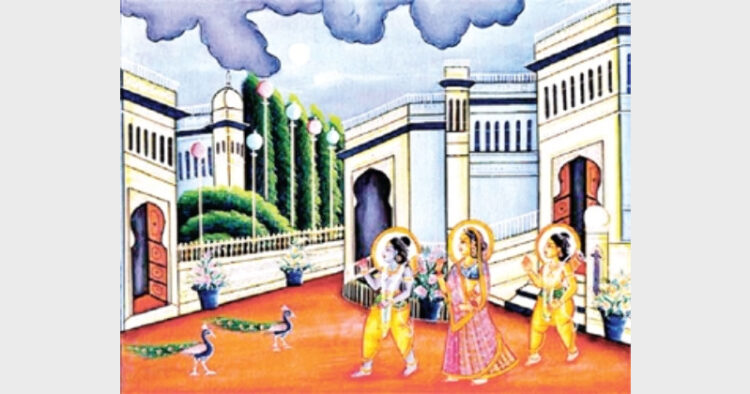Ramayana for Life Skills: The Departure
|
The citizens that assembled to witness the grand coronation ceremony of Rama were plunged into deep sorrow on knowing the developments at Ayodhya.
Rama with Lakshmana and Sita went to Kaikeyi to bid adieu. She took out the royal garments and robes from them and instead gave them tree barks and garlands of beads befitting the uniform of the ascetics. Seeing this sudden discordance of fate, all the assembled mass wept relentlessly and hung their head in shame. Unable to bear the sight, sage Vasishta rushed in and scolded Kaikeyi for such cruelty meted out to Sita.
As per the advice of Rama, Sita gave away all her ornaments to Anasuya, wife of sage Atri.
Then they went to Kausalya’s chamber to say farewell. Lakshmana took the hands of Kausalya and handed them over to that of Sumitra, his own mother, as if a request to look after her. Sumitra grasped her son’s mind and blessed him thus:
“Lakshmana, treat Rama as your father Dasaratha. Consider Sita as I. Imagine that the forest is Ayodhya.”
Leaving them Rama, Sita and Lakshmana went to Dasaratha to seek to be relieved. The unfortunate king tried to hug them and unable to do that fell again into a swoon.
By the time Sumantra came with a chariot and all the three ascended on it. Rama and Lakshmana took all their weapons with them. Then Dasaratha recovered a little and shouted to Sumantra to stop the chariot while Rama persuaded him to drive it quickly. All the citizens, sobbing and crying followed the royal off-springs on foot.
Many scholars and connoisseurs of the Ramayana say that the best shloka composed by Maharshi Valmiki is delivered by queen Sumitra whose appearance in the vast screen of the Ramayana is very short. The shloka is her advice to Lakshmana, her own son, who was to follow Rama to the forest. It is: Ramam Dasaratham Viddhi…”.
Just one stanza. With this single stanza, Sumitra makes herself the supreme personality of womanhood. In fact, among all the Puranas or the ancient Vedic literatures only two women characters are considered extremely great – exemplary – in their behaviour and character. One is Sumitra in the Ramayana and the other is Gandhari in the Mahabharata.
Dasaratha now lost his self control and started crying aloud: “Ha Rama, Rama… my dear son, ha Lakshmana, ha ha Janaki, leaving me alone in this pool of sorrow where you are going to? I am nearing my death and this sinner has not had the fortune of having either of you on my death bed. Ha Rama, Rama, Lakshmana, Sita, forsake me not.” Thus went on the king.
When Rama, Sita, Lakshmana and Sumantra reached the bank of the Ganga, a huge gathering of citizens had been following them. When Rama tried to convince them and persuade them to return to Ayodhya, they unanimously said: “Prince, Ayodhya is a desert for us without you. Wherever you go, we shall follow suit.”
Around midnight all the citizens fell into deep sleep fatigued by the long journey on foot. Rama told Sumantra: “All our people are asleep unconsciously. Let the chariot go to few stones towards Ayodhya and then turn again to the bank of the Ganga. These innocent people while waking up will think that we have returned to the kingdom. “
Sumantra acted accordingly. Rama, his wife and brother descended from the chariot and gave order to Sumantra to leave for Ayodhya. “Tell my father,” said Rama: “Not to worry about us and be happy.”
They reached the Nishada hamlet ruled by Guha, an old friend of Rama.
Hearing the news of Rama’s arrival, Guha reached the spot with all pooja ingredients and worshipped them. Guha offered his kingdom to Rama that was politely refused. A sturdy boat was arranged and Guha himself ferried the three. As they reached the other bank of the Ganga, Guha said:
“Swami, take this humble servant also along with you.” Rama cajoled him and promised that on return he would spend a day with Guha.
-KK Shanmukhan ( To be concluded )














Comments